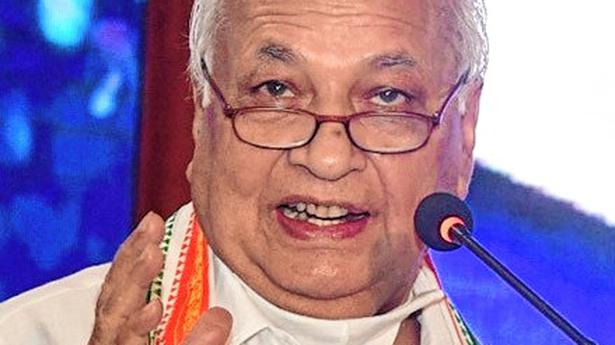
In Kerala, acrimony over appointments
The Hindu
The Kerala Governor has negated the advantage the government enjoyed in selecting the Vice Chancellor
The relationship between Kerala Governor Arif Mohammad Khan and the State government has entered yet another thorny phase over differences in opinion on the bounds of the Chancellor’s role in the functioning of universities. The tussle has been in the making for nearly a year after the Governor confronted the government over the University of Kerala’s refusal to confer honorary doctorate on former President Ram Nath Kovind. The reappointment of the Vice Chancellor of Kannur University had also annoyed him. These instances prompted him to declare his unwillingness to continue as Chancellor of universities.
Chief Minister Pinarayi Vijayan had led the government’s rapprochement efforts earlier after the Governor reportedly withheld his assent to the policy address on the eve of the Budget Session of the Legislative Assembly. Nevertheless, the government has quietly endorsed the growing clamour of some States, including Maharashtra, Tamil Nadu, West Bengal and Odisha, to work towards trimming the powers of the Chancellor over universities in order for the government to gain greater control.
Also read | Governor springs a surprise, forms selection panel for Kerala University Vice Chancellor
Within a few months, a government-constituted commission that was mandated with overhauling university laws advocated stripping the Chancellor off his discretionary powers. It instead recommended that a University Tribunal be formed to decide on legal matters. It also called for reducing the Governor’s authority in the selection of Vice Chancellors. Another Commission tasked with suggesting reforms for the higher education sector has mooted separate Chancellors for each university.
While the government prepared to bring out an Ordinance to implement such reforms in the University of Kerala prior to the selection of the next Vice Chancellor, the Governor made a pre-emptive move by initiating the process on his own without consulting the State government.
Mr. Khan also refused to re-promulgate 11 key Ordinances that have now lapsed. While claiming to have been provided little time to “apply his mind” in examining the Ordinance, he took a swipe at the State government by averring that “ruling through Ordinances is not desirable in a democracy”. His comments emboldened the Opposition to accuse the ruling dispensation of adopting an ‘Ordinance Raj’ to bypass the legislature in implementing contentious laws. The lapsed Ordinances included the contentious Kerala Lok Ayukta (Amendment) Ordinance that amended Section 14 of the Kerala Lok Ayukta Act, 1999 which empowered the ombudsman to remove a corrupt public official from office and prevent the person from holding office again. The Ordinance enabled the Governor, the Chief Minister or the State government to “either accept or reject the declaration”.
Also read | No adversarial approach over Governor not signing ordinances: LDF

“Writing, in general, is a very solitary process,” says Yauvanika Chopra, Associate Director at The New India Foundation (NIF), which, earlier this year, announced the 12th edition of its NIF Book Fellowships for research and scholarship about Indian history after Independence. While authors, in general, are built for it, it can still get very lonely, says Chopra, pointing out that the fellowship’s community support is as valuable as the monetary benefits it offers. “There is a solid community of NIF fellows, trustees, language experts, jury members, all of whom are incredibly competent,” she says. “They really help make authors feel supported from manuscript to publication, so you never feel like you’re struggling through isolation.”

Several principals of government and private schools in Delhi on Tuesday said the Directorate of Education (DoE) circular from a day earlier, directing schools to conduct classes in ‘hybrid’ mode, had caused confusion regarding day-to-day operations as they did not know how many students would return to school from Wednesday and how would teachers instruct in two modes — online and in person — at once. The DoE circular on Monday had also stated that the option to “exercise online mode of education, wherever available, shall vest with the students and their guardians”. Several schoolteachers also expressed confusion regarding the DoE order. A government schoolteacher said he was unsure of how to cope with the resumption of physical classes, given that the order directing government offices to ensure that 50% of the employees work from home is still in place. On Monday, the Commission for Air Quality Management in the National Capital Region and Adjoining Areas (CAQM) had, on the orders of the Supreme Court, directed schools in Delhi-NCR to shift classes to the hybrid mode, following which the DoE had issued the circular. The court had urged the Centre’s pollution watchdog to consider restarting physical classes due to many students missing out on the mid-day meals and lacking the necessary means to attend classes online. The CAQM had, on November 20, asked schools in Delhi-NCR to shift to the online mode of teaching.









